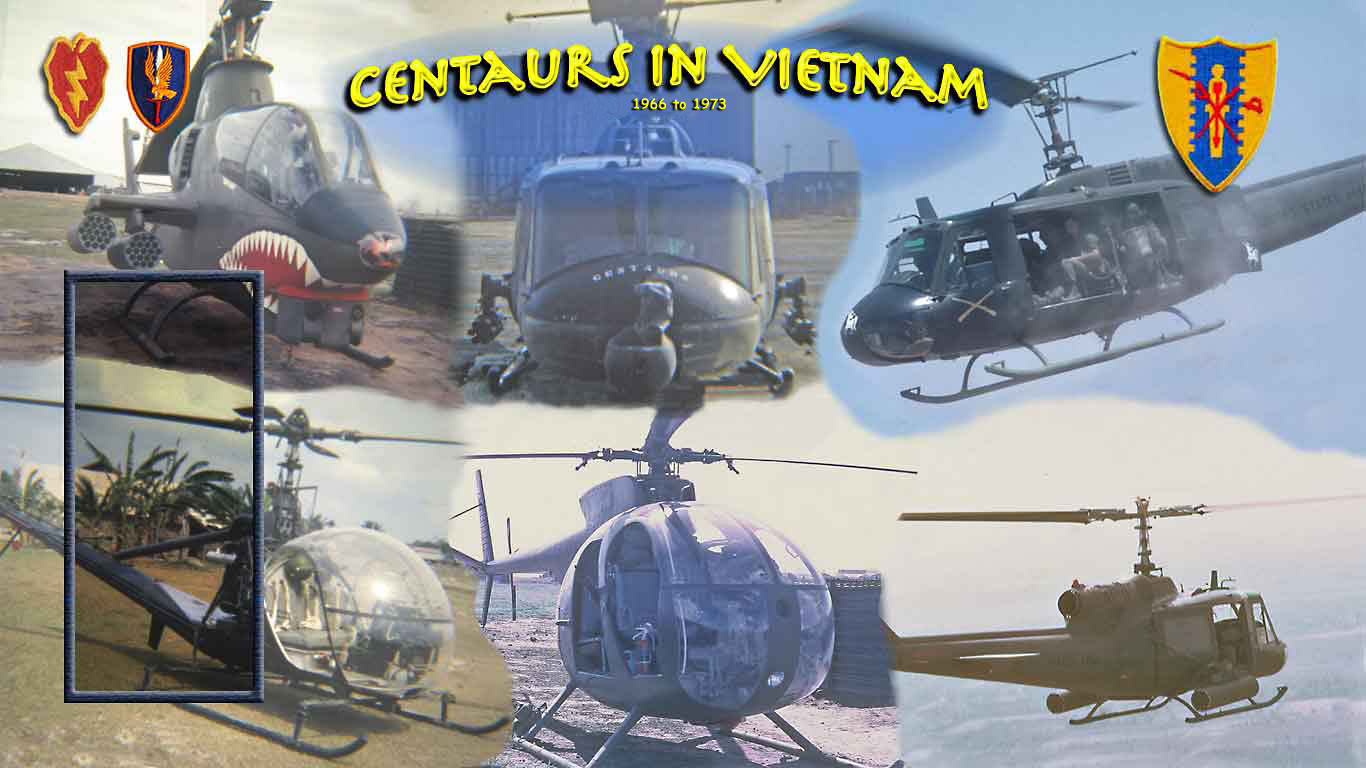

U.S. Copter Pilots Are Happiest When Job Is Tough
by Joseph B. Treaster

Story from the New York Times about Troop F, 4th Cavalry - April 1972. Sent in by Hugh "Sandy" McLeod, (Jul 70 - Jun 71).
The story involves Centaurs CPT Don Haynie, LT Phil Bruce, MAJ John J. Spencer, CPT Paul Martindale
........................................................................................................................................................................Phu Bai, South Vietnam, April 16 1972
At 9:10 am yesterday an American attack helicopter went down southwest of Quang Tri city, flames pouring from one of its barrel-like rocket launchers.
Less than five minutes later the pilot and co-pilot of another copter raced out of the operations shack here and took off for the area where the aircraft had been hit by enemy gunfire. There was no particular emergency. The two crewmen of the damaged helicopter had already been picked up unhurt.
"That's just the way we operate," said CPT Don Haynie, 32, of Shenandoah, Iowa, who commands the Cobras in Troop F of the United States Fourth Cavalry.
"Fox Troop," as it is known, is the only United States Army combat unit directly supporting the South Vietnamese in the fighting in the extreme northern province, Quang Tri. A unit of distinctive character and flair, its swashbuckling pilots emulate the daredevils who cavorted in the skies over Europe in World War I.
They are intensely loyal to one another and, like varsity football players, eager to get into the game. For them the unusually heavy antiaircraft fire in Quang Tri is an exciting test of courage and skill. They regard themselves as professionals, detached from politics.
"I don't think anybody is flying up here for the flag, motherhood and apple pie," said 1LT Phil Bruce, 25, of Atlanta. "I think people are flying here because they enjoy it. It's a challenge to fly here. You can't find more challenging flying anywhere in the world. There's something about flying and getting shot at." Such attitudes are widely shared in air cavalry helicopter troops and fighter-bomber squadrons in Indochina.
Big Spurt in Morale
The Fox Troop pilots had no choice about being called into the current offensive, but their commander, Maj. John J. Spencer of Magee, Miss., said he jockeyed against other units for the most dangerous area.
"Morale has been higher up here than any time since I've had the unit," said Major Spencer, who took command two moths ago, when the troop was in the Saigon area, "because we're working at what we're supposed to be doing."
For the most part the troop has been flying reconnaissance missions in the no man's land two to three miles in front of the South Vietnamese soldiers and along their flanks. The copters have been going lower than usual because of the threat of surface-to-air missiles - which have not been used against helicopters so far- and because it is easier to dodge heavy caliber antiaircraft fire by flying low and fast.
The helicopters swoop invitingly close to the enemy, daring him to fire and give away his location. Then they blast back with rockets and cannon, dart out of the way and radio the position to ground commanders.
The pilots have also escorted South Vietnamese helicopters on risky resupply runs into besieged bases, blazed a path for advancing infantrymen and, once, knocked out a tank that had stopped a South Vietnamese column. They have also shuttled American infantrymen into defensive positions on the ridges west of Phu Bai.
When the pilots are on the ground, they sport rakish black Stetsons set off with gold braid and a small gold-plated crossed sabers- a copy of the headgear of General Custer's day. Some men also wear scarves in the red and white colors of the cavalry. There is a sheen on their boots that is rare even in the rear, let alone in combat areas.
For formal occasions the men wear silver spurs and their commander straps on a Civil War cavalryman's saber with chrome-plated blade and brass handle.
So far, no one in Fox Troop has been killed in the operations in Quang Tri, but there have been some near misses, and for all their bravado, the pilots are not fearless.
The craft the Capt. Paul Martindale, 26, of Ozark, Ala., flies has been hit twice in the last week; a North Vietnamese bullet missed him by a fraction of an inch. He loves flying, the boyish-looking pilot said, but the close calls have set him thinking.
"It's fun," he remarked, "until somebody gets shot."